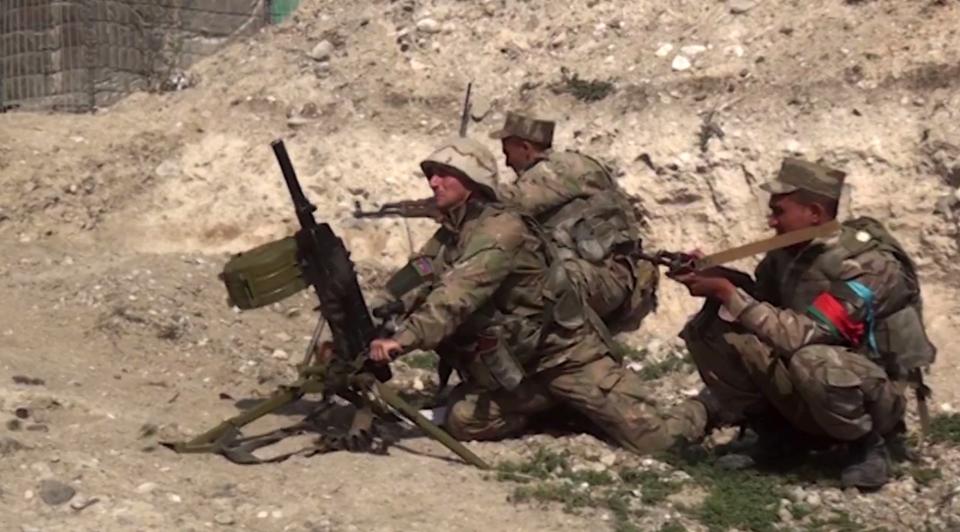Why are Armenia and Azerbaijan fighting over the disputed Nagorno-Karabakh region?

A territorial dispute between Armenia and Azerbaijan has re-erupted with the heaviest clashes in years, with both sides accusing each other of using heavy artillery amid reports of military personnel and civilian deaths.
Heavy fighting broke out on Sunday morning in the disputed separatist region of Nagorno-Karabakh that lies within Azerbaijan but is controlled by ethnic Armenian forces backed by Armenia.
It was not immediately clear what sparked the fighting between the two former Soviet republics, which marks the latest periodic clash in a decades-long conflict over the region and comes two months after fighting in July killed 16 people from both sides.
The renewal of conflict has meanwhile reignited concern over stability in the South Caucasus region, a corridor for pipelines carrying oil and gas to world markets.
So, here's what you need to know:

Why is Nagorno-Karabakh a disputed region?
Nagorno-Karabakh is a mostly mountainous region of some 4,400 square kilometres (1,700 square miles) and lies 50 kilometres (30 miles) from the Armenian border.
In 1988, as the Soviet Union was disintegrating, Azerbaijani troops and Armenian secessionists began a war during which thousands of people were killed and eventually left the de facto independent state in the hands of ethnic Armenians when a truce was signed in 1994.
The region is recognised as part of Azerbaijan under international law, but the ethnic Armenians who make up the vast majority of the population reject Azerbaijani rule.
Long-running negotiations have so far failed to produce a permanent peace agreement for resolving the territory’s status.
What happened on Sunday?
It was not immediately clear what prompted the clashes on Sunday, but military personnel and civilians were reported to have been killed during the fighting.
Armenia's defence ministry said an attack on civilian settlements in Nagorno-Karabakh, including the regional capital Stepanakert, began on Sunday morning.
The separatist authorities in the region said 18 people were killed - 16 of their troops, a woman and a child - and 100 others were wounded after Azerbaijan launched an air and artillery attack.
On Monday, the region's separatist authorities reported that 15 more of its soldiers had been killed.
Azerbaijan, for its part, said six Azeri civilians had been killed and 19 injured since the fighting began.
Azerbaijan’s defence ministry said Armenian forces were shelling the town of Terter.
Armenia also claimed that two Azerbaijani helicopters were shot down and three Azerbaijani tanks were hit by artillery, but Azerbaijan's defence ministry only confirmed the loss of one helicopter, saying the crew had survived, and denied the other losses reported by Armenia.
In response to the fighting, Azerbaijani President Ilham Aliyev ordered martial law be imposed in some regions of the country and called for a curfew in major cities.
Martial law, an emergency measure under which the military takes over the authority and functions of civilian government, has also been declared in Armenia and Nagorno-Karabakh.
How has the world reacted?
The clashes have spurred a flurry of diplomacy to defuse the reignited tensions between majority Christian Armenia and mainly Muslim Azerbaijan.
Russia, traditionally seen as an ally of Armenia, called for an immediate ceasefire and another regional power, Turkey, said it would support Azerbaijan, its traditional ally.
China meanwhile urged both sides to show restraint, while France, which has a large Armenian community, called for an immediate ceasefire and dialogue and US President Donald Trump said the White House was seeking to stop the violence.
Iran, which borders both Azerbaijan and Armenia, offered to broker peace talks, while UN Secretary-General Antonio Guterres said he was "extremely concerned" by the clashes and called for both sides to stop fighting.
Speaking at the Vatican on Sunday, Pope Francis said that he was praying for peace between the two countries, urging them to them to “accomplish concrete deeds of goodwill and fraternity” to reach a peaceful solution through dialogue.
Read more
Trump tweet about Barack Obama’s taxes resurfaces in wake of reports
Hospital patients airlifted to safety amid savage California wildfire
Boy thrown from Tate Modern viewing platform can now stand unaided

 Yahoo News
Yahoo News 
